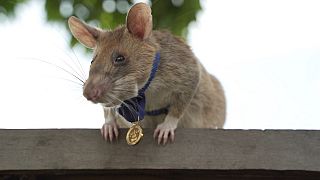Kenya
Kenyan authorities have welcomed the progress made in the fight against poaching, after the publication Monday night of the first animal census conducted in the country, which should serve as a basis for improving environmental conservation.
According to the data, Kenya has 36,280 elephants, among other things, a population that is up 21 percent from 2014, when poaching peaked.
"Efforts to increase penalties against crimes related to endangered species appear to be paying off," the census authors say in their report.
President Uhuru Kenyatta praised the success of environmental protection agencies in their fight against poaching, while urging them to find innovative approaches to protect wildlife.
"(Wildlife) is our heritage, it is our children's heritage and it is important for us to know what we have, so that we are better informed in our policy and actions," the head of state said in a statement.
The International Union for Conservation of Nature (IUCN) warned in March that Africa's elephant population was being decimated by poaching and habitat destruction, particularly through land conversion for agriculture.
The population of African savanna elephants has plummeted by at least 60% over the past 50 years, resulting in their classification as "endangered" in the latest update of the IUCN's "danger list".
This census, financed by the Kenyan government, allowed to count 30 different species of animals on the nearly 59% of the territory studied.
The number of lions, zebras, hirolas (hunting antelopes) and the three species of giraffes found in Kenya is increasing, the report states, without however providing comparative data with previous years.
A total of 1,739 rhinos were also counted, including two northern white rhinos, 840 southern white rhinos and 897 critically endangered black rhinos.
The Maasai Mara Reserve in the south of the country is home to nearly 40,000 wild life.
"Obtaining this level of information ... allows for better policy, planning and assessment of areas that need attention," Wildlife Minister Najib Balala said in the report.
"It is a national heritage. We must be proud of it," he said.
However, the report stresses that special attention must be paid to certain species of antelopes, such as sand antelopes and mountain bongos, of which there are less than 100 specimens each.
These species could become extinct if urgent action is not taken.
Progress could also be threatened by exponential human population growth and the concomitant increase in the need for land, both for habitat and for economic activities (livestock, logging, charcoal consumption), the report warns.










00:52
Saïdia: Morocco's Blue Pearl of the Mediterranean
02:38
Natural harmony of Uganda's 'Ghost Island' under threat from international tourism
01:00
Animal shelters in the US use live music to soothe anxious pets
02:01
Raptor rehab: Moroccan facility rescues birds of prey and prepares them to return to the wild
01:05
Zimbabwe to cull 50 elephants, distribute meat to locals
01:45
How cutting off rhino horns might help curb poaching